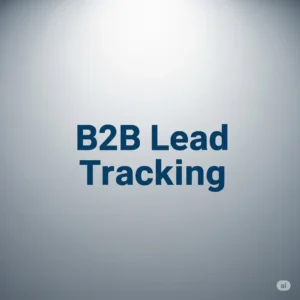In the business world, finding new customers is a big goal. For companies selling to other businesses, these are called B2B leads. But just finding them isn’t enough. You also need to know what they’re doing. This is where B2B lead tracking becomes super important. It’s like having a map and a tracker for every person interested in your business. You can see their journey. You can understand what they like. This helps you guide them better. Tracking helps businesses make smart choices. It helps them close more deals too.
What is B2B Lead Tracking
B2B lead tracking means watching how latest mailing database potential customers interact with your business. It’s about seeing their steps. For example, did they visit your website? Did they open your emails? Did they download a guide? Each action tells you something.

Tracking helps you collect this information. It puts all the details in one place. This way, your sales team knows what to do next. It makes their work much easier. They can talk to leads at the right time.
Why Tracking Your Leads is So Important
Tracking leads brings many good things to a the future of outbound lead generation business. First, it helps you understand your customers better. You learn what they care about. Second, it makes your sales process more efficient. Salespeople don’t waste time on uninterested leads. They focus on hot ones. Third, it helps you improve your marketing. You see which efforts bring the best leads. Therefore, tracking leads helps businesses save money. It also helps them make more money. It’s a smart way to work.
What Information Should You Track
When you track leads, you look at different kinds trust review of information. You want to know their contact details. This includes names, company, and job titles. You also track their behavior. What web pages did they visit? Which emails did they open or click? Did they attend a webinar? Furthermore, you note their engagement level. Are they very active or just Browse? This data builds a full picture. It shows how interested they really are.
Tools for B2B Lead Tracking
To track leads well, businesses use special tools. One of the most common is a CRM (Customer Relationship Management) system. Think of it as a big digital notebook. It stores all lead information. It also shows their activities. Another tool is marketing automation software. This helps send emails. It tracks clicks too. Website analytics tools also play a part. They show who visits your site. Using the right tools makes tracking easier. They organize all your data for you.
The Lead Tracking Process: Step-by-Step
The process of B2B lead tracking usually follows a few steps. First, you identify a new lead. This might be from a website form. Second, you collect their information. This goes into your CRM system. Third, you monitor their activities. You watch what they do. Fourth, you update their profile. New actions get added. Finally, you analyze the data. This helps you understand patterns. This step-by-step approach ensures no lead gets lost. It makes sure you know their journey.
Using Tracking Data to Improve Sales
Once you have tracking data, you must use it. This data helps your sales team. They can see which leads are ready to talk. They know what topics interest each lead. This allows for personalized outreach. Salespeople can tailor their messages. They can also decide when to call. If a lead visits your pricing page often, they are likely interested. This makes sales efforts more effective. It increases the chance of closing a deal.
The Future of Lead Tracking: Smarter Insights
Lead tracking is always getting better. New technologies are helping. Artificial Intelligence (AI) can now analyze data faster. It can even predict which leads are most likely to buy. This makes tracking even smarter. Automation also helps. Many tracking tasks can be done automatically. This frees up human sales staff. They can focus on building real connections. The goal is to make lead tracking more powerful. It helps businesses grow faster and better.
